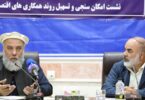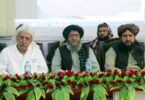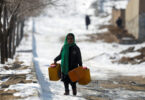WASHINGTON (VOA): Afghans who worked with U.S.-funded programs and projects in Afghanistan welcome a new program offering them relocation opportunities, but some analysts worry the program will accelerate the “brain drain” of young and educated Afghans from their country.
The U.S. Department of State on Monday announced a new program that will allow thousands of Afghans who might be at risk because of their affiliation with the U.S. in Afghanistan to relocate to the United States as refugees.
“This is a good opportunity,” said Sinah Rawish, 28, of Kabul, who has been working with Save the Children in Afghanistan for four years. She said she faced “direct or indirect threats,” because of her job with an international organization.
Rawish told VOA that she’d worked from home for the past three months because of the worsening security situation and the Taliban’s territorial gains in the country.
“In fact, women and men who believe in democracy, citizen rights and human rights cannot live under the Taliban,” she said.
Rawish voiced concern for her safety as the U.S. completes the withdrawal of its remaining troops from Afghanistan.
The Taliban have captured more than 150 districts in the past three months. The militant group has continued its offensive on the cities of Herat, Kandahar and Lashkar Gah.
False Taliban guarantees
In a statement in June, the Taliban said it would not harm those who worked with the Afghan government and international forces in Afghanistan, but the government in Kabul and human rights groups have accused the Taliban of extrajudicial killings of government affiliates in areas they captured.
“Taliban forces advancing in Ghazni, Kandahar and other Afghan provinces have summarily executed detained soldiers, police and civilians with alleged ties to the Afghan government,” Human Rights Watch said in a report published Tuesday.
The targeted killings and assassinations of civilians, particularly human rights activists, have also surged in Afghanistan in recent months. The United Nations, in a report released last month, said more than 400 people had died in targeted killings in the first six months of 2021.
Lengthy process
Zainullah Stanekzai, who has been working with U.S. and international media for 14 years, told VOA that if the security situation did not improve, he might consider applying for the new program.
Besides those who worked with the U.S. government, armed forces, and U.S.-funded programs and projects, Afghans who worked with U.S. media and nongovernmental organizations are also eligible to apply for relocation through the new U.S. program.
Stanekzai, a resident of Lashkar Gah, the capital of southern Helmand province, fled with his family to Kabul because of the fighting in his hometown.
“Those responsible international organizations should interfere to stop the war so that we won’t be forced to leave,” said Stanekzai.
He also said that the process of applying for relocation was lengthy, since the applicants have to go to a third country to wait while their cases are processed.
“They have to go to a third and then to America. Why can they not go from Afghanistan?” asked Stanekzai.
“It will take quite a while to get through processing,” said Elizabeth Threlkeld, a senior fellow and deputy director of the South Asia program at the Stimson Center in Washington, adding, “The processes and legal requirements are quite strict under U.S. visa law.”
Brain drain
Threlkeld said it was a “moral obligation” for the U.S. government to care for those who were affiliated with the U.S. in Afghanistan, but her main concern is the departure of young and educated Afghans.
“My long-term concern is just the brain drain aspect that so many of these people are young, promising educated Afghans” leaving the country, she said.
Kabul-based political analyst Najib Azad said he thought the new U.S. refugee program for Afghanistan would accelerate the brain drain in the country, since most of those who worked with the U.S.-funded projects and programs are well educated.
“The negative aspect of the process is that the literate class, the young class, and those who can save the country are leaving the country,” said Azad.
He added that those who worked with the U.S. have no other options but to leave because no one can “guarantee their safety in Afghanistan.”






